The process of emptying the bladder is a physiological phenomenon and should not cause a person absolutely no unpleasant, painful or uncomfortable feelings. Intermittent urination rather unpleasant symptom that affects not only the functional activity of the urinary system, but also on General health of the patient.
Most all men face the problem of intermittent urination, due to the existence of such a body as the prostate, pathological processes, which cause violations of the patency of the lumen of the urethra.
Despite the fact that this problem is a lot of men, women, intermittent urination also indicates the beginning of a number of serious diseases, which are discussed below.
Anatomical aspects
In order to understand all the possible mechanisms of disorders of urination, it is necessary to briefly review the processes of formation of urine and emptying of the bladder.
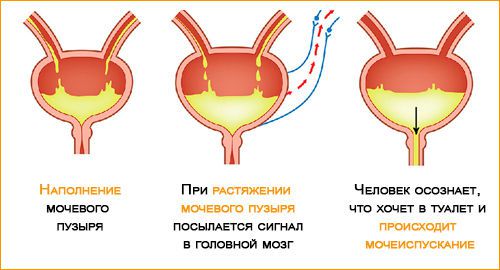
As you know, urine (urine) is formed by filtration in the glomerular apparatus of kidneys. Through him every second “run” whey of blood which is cleared of harmful components and unnecessary toxins.
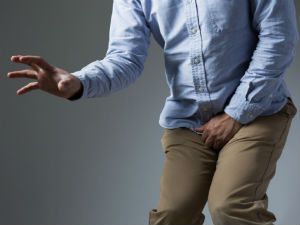
Further, the urine flows into the Cup-pelvis-plating system of both kidneys, after which gradually out through the ureters into the lumen of the bladder. As long as the receptive apparatus of the body does not receive a signal of a sufficient filling of the bladder, the sphincters of the urethra (urethra) remains closed.
As soon as the volume of urine will be enough, starts a nerve impulse from receptors in the wall of the bladder to the overlying parts of the Central nervous system. This leads to the opening of the sphincter and simultaneous contraction of the muscular apparatus of the bladder, helping urine to freely go outside through the urethra.
Understanding the question of the anatomy of the organs of the urinary system, it is necessary to focus on the following facts, which play a significant role in the interruption of the jet of males, namely:
- the male urethra is quite long and narrow, while it has several anatomic bends (women, on the contrary, the urethra is wide and short);
- the upper part of the urethra tight ring covers the prostate gland, that’s why it directly leads to a violation of the process of emptying.
The main causes of the pathological process
Based on the physiology of the act of emptying, it becomes clear that the reason for intermittent urination may be associated with direct lesions of the bladder, urethra or prostate.
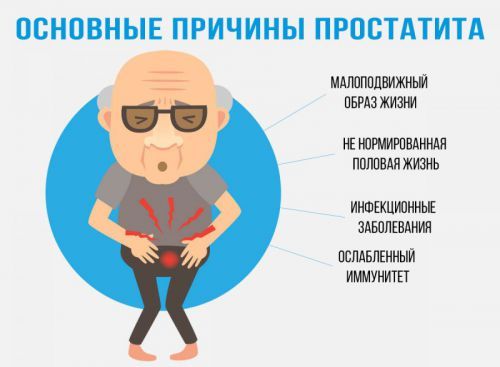
More talk about the most common diseases.
- Inflammatory processes in tissues of the prostate (acute or chronic prostatitis). Due to the inflammatory component, the organ is much increased in size, which leads to narrowing of the lumen of the urethra, and a portion of the flow of urine.
- The tumor in the prostate tissue. The first place among oncological processes in men is exactly the swelling of the gland, which quite easily becomes malignant. As long as the size of the tumor focus is not become large, the disease can occur with a poor symptomatology, which men, as a rule, do not attach due importance.
- Urolithiasis. Obstruction of the excretory duct from the urinary bladder into the urethra, or closure of the lumen of the urethra at any level. If the concretion is small, it is able to achieve on their own, which makes the act of urination and the nature of the jet.
- Inflammatory process localized in the cervical part of the bladder(cervical cystitis, which often occurs in women and is accompanied by all the typical clinical disease).
- The violation of innervation of the bladder wall, resulting in uneven contraction of different muscle fibers, and a portion of the flow of urine into the lumen of the urethra (for example, on the background of traumatic brain injury or damage to lumbar spine).
- The inflammatory process in the urethra (acute or chronic urethritis). A violation of the separation of urine occurs due to a inflammatory component, and tissue edema.
- Stricture of the urethra. The most common cause of this process is associated with a long-term or latent inflammatory processes in the urethra that are not treated in time. Thus cells of the epithelial layer is replaced by connective tissue component, which greatly narrows the lumen of the urethra.
- The tumor in the lumen of the urethra. The tumor process can completely block the lumen of the organ and cause acute urinary retention (rare).
Such diseases as prostatitis, is not uncommon in patients of young age (20-25 years)
The symptoms that you need to pay attention
As a rule, intermittent urination is not the only manifestation of the pathological process, it is accompanied by other symptoms that are observed among adult men and younger boys.
These include:
- despite the desire to urinate, the patient has to make an effort for evacuation (urine does not appear immediately, but after a certain time, gradually the duration of the act significantly increases);
- there is a weakening of the pressure of the stream of urine, until its release in drops or very small portions (“sluggish” stream);
- after going to the toilet is a feeling neporozhnego bladder, unpleasant feeling of discomfort, etc.;
- at the time of discharge may appear pains, burning and pain of different severity;
- an increasing number of trips to the toilet during the night;
- there are unpleasant sensations in the lower abdomen or periodic aching nagging pain that intensifies during urination;
- the body temperature rises, the patient has symptoms of intoxication (weakness, lethargy, malaise, loss of appetite, etc.);
- possible any unexplained weight loss, excessive sweating at night and no physical activity;
- urinary sediment changes colour or smell, there are traces of pus, blood, clots, etc.
Urethritis is one of the causes of urinary disorders
A diagnostic algorithm
Intermittent urination always requires a diagnosis, regardless of the patient’s General condition, and who experience this symptom: in an adult or child.
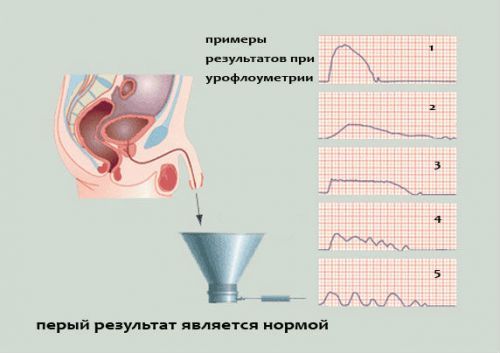
Laboratory-instrumental examination includes the following procedures:
- General clinical studies of blood and urine;
- biochemical analysis of blood and urine;
- urine analysis according to Nechyporenko;
- trehstakannaya test urinary sediment;
- the determination of markers specific to the cancer processes in tissues of the prostate (PSA);
- a urine culture on nutrient media, and determination of antibiotic sensitivity of the identified infectious agent;
- General and excretory urography;
- Ultrasound of organs of urinary system and prostate (using a transrectal probe);
- cystoscopy and urethroscopy;
CT or MRI of the urinary tract and prostate have the advantage over other instrumental studies due to its high informative and non-invasive.
Uroflowmetry is a procedure that allows to estimate the parameters and the main characteristics of urination
Clinical management of the patients
Treatment intermittent urination, should be aimed at complete elimination of the underlying disease which was the cause of this unpleasant symptom. If we are talking about inflammatory processes in the bladder, urethra or prostate tissue, the mainstay of treatment is to provide anti-bacterial drugs.
Urolithiasis requires the patient to comply with the special diet, the purpose of which is the splitting of stones, and preventing their further formation. In the case of large stones, produce their surgical removal (e.g., shock-wave lithotripsy).

Scar contraction of the urethra removed by endoscopic dissection of adhesions, as well as the procedure of begerovaya.
Benign tumor of the prostate treated conservatively, for this prescribed drugs with anti-tumor effect.
Thanks to the methods of modern surgery possible laser removal of the tumor
Tumors of a malignant nature eliminated only by surgery, the amount of which is determined by the size of the pathological focus, and invasion in surrounding tissues and lymph nodes, neglect of the process, the General condition of the patient, etc.
Prevention
In order to protect yourself from any problems with urination, you must adhere to the following guidelines:
- to diagnose and treat diseases of the genitourinary system annually to undergo routine medical examinations, especially if next of kin had similar problems;
- eat a healthy diet, lead an active lifestyle, take daily walks in the fresh air, to adhere to the principles of healthy lifestyle;
- recommended to avoid hypothermia, swimming in cold water and is located on the drafts;
- sex life should be regular, it is necessary to practice sex with one sexual partner, and not to neglect the rules of contraception.
Healthy lifestyle – prevention of voiding
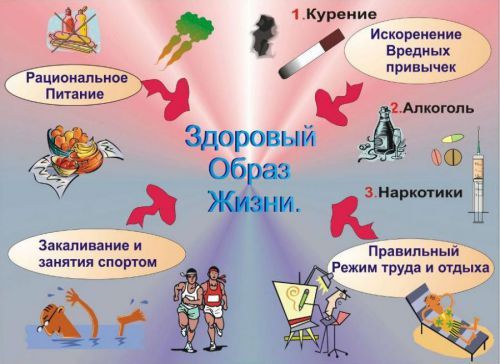
If the process of urination brings any feeling of discomfort, you should immediately seek help from a specialist (GP or urologist), because this symptom can hide a serious problem.
Do not forget that the sooner the doctor will proceed with the adequate treatment the sooner the recovery, and the less likely serious complications.



